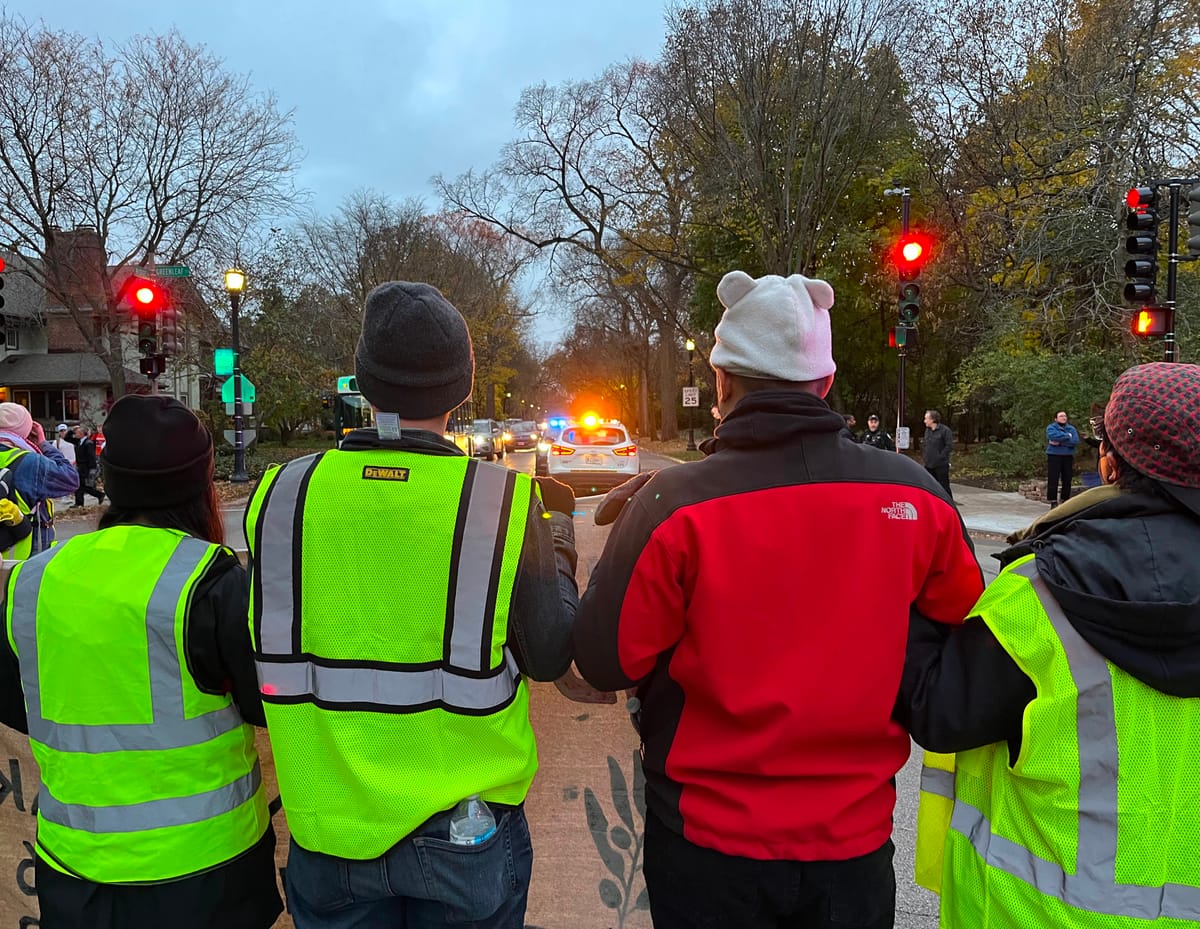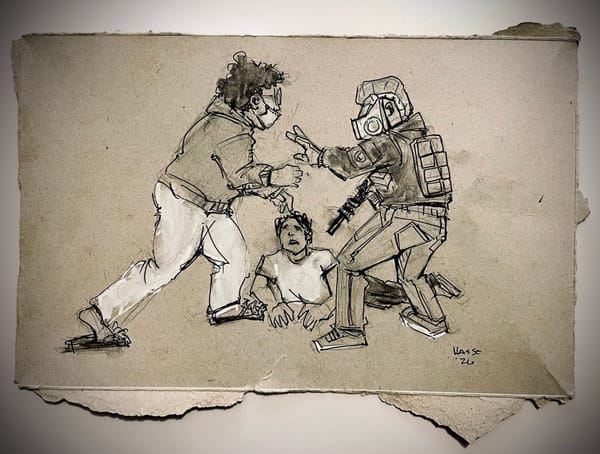Take a Deep Breath and Think About What You Need to Do
How powerful will we choose to become as the world falls down and what will we have the potential to build?

The past few weeks have been pretty rough for people who care about each other and the fate of the natural world. The Supreme Court dished out a series of nightmarish decisions, and people are understandably reeling. Policies criminalizing homelessness have been affirmed. Environmental protections, which were already woefully inadequate, have been imperiled. The presidency has officially been elevated beyond the reach of criminal law. In recent days, the march of fascism has felt more like a series of leaps. Joe Biden’s confused performance at last week’s presidential debate felt representative of a bigger picture: our only electoral alternative to blatant dictatorial fascism comes from a party that offers no coherent solutions to the problems we face and no meaningful defenses against the rise of Christian nationalism. These are frightening times, and like many of you, I was rattled by these developments. However, I calmed down a bit when I settled into the reality that all of these events, while deeply disturbing, are within the scope of what I have expected from U.S. politics for some time now. Therefore, my beliefs and analysis about what the moment demands of us at a grassroots level are relatively unchanged.
Some people have asked me what we should do in the wake of these Supreme Court decisions. How can we fight back? Sadly, there are no immediate fixes. The future is going to require a lot of out-of-the-box thinking and a rejection of the legitimacy of the law and institutions that enforce it. I have no all-encompassing formula for what that process looks like, but what I do know is that we must build power at the community level and that we must do so with great urgency. Whatever community defenses we must mount on behalf of unhoused and other criminalized people, whatever fascist edicts we must resist, will require us to be organized as we have never been organized before. To defend our lives and to defend the planet, we will need resilient networks of people who are more invested in each other and our collective survival than they are in the systems that would destroy us. We need to build power, block by block, within our schools, in our workplaces and churches, and anywhere else where we can build connections around our shared values and survival. We need tight-knit communities and strong bonds of fellowship. We need to sharpen our skills to address the common problems that tend to rip our movements apart, such as conflict, unprocessed trauma, and a lack of political education. We need to rise above the alienation and individualism that keep us isolated and afraid so that we can find strength in each other.
Mariame Kaba and I discuss the kind of skill-building and analysis around collective survival that we need in this moment in our book Let This Radicalize You. I am not exaggerating when I say that all of my best advice about how we can survive these times is in that book. We wrote Let This Radicalize You with many of the struggles we are currently facing in mind: the criminalization of homelessness, spiraling environmental destruction, and the rise of fascism. I am a hopeful person, but it has been evident to me for some time that the forces that would destroy us would gain more traction before we would have any hope of putting them down. That does not mean we are doomed. It means that the destructive impacts of capitalism, rightwing politics, and neoliberalism have been compounding for many years and were never going to abate quickly or easily.
There are many storms ahead, and our organizing must be a politics of solidarity and survival. Both neoliberal and fascist politics involve a cheapening of human life and an ever-increasing disposal of human beings to sustain the status quo. In a time of collapse, the disposal of surplus people must ramp up to keep the engines of capitalism running. For the rich to continue to get richer, catastrophic loss must be deemed inevitable. There are competing brand names that offer different variations of this destruction, and one is more immediately frightening to many of us, but it’s all a death march. Both must be challenged with a politics of care and a refusal to abandon one another. During the Trump administration, we often heard the headline-sourced refrain, “I don’t know how to explain to you that you should care about other people” – as though caring about others was a commonsense position and the notion of having to explain it was unthinkable. The truth is, when it comes to Palestinians, imprisoned people, migrants, unhoused people, and many others, caring about people and insisting upon their survival has long been a rebellious position.
Cooperating with the disposal of people marked for violence or erasure under capitalism is characterized as “peacefulness” in this society, and what we have always needed is a rejection of that “peace.” Trump is a special kind of nightmare, and I am duly horrified by the prospect of a dictatorial Republican takeover, but regardless of who wins the 2024 presidential election, insisting upon the survival of those marked for disposal under this system will be an increasingly rebellious proposition. To sustain itself, the system has to normalize more mass murder and more mass death. The law was always going to bend, break, and reshape itself to facilitate those harms. The question is, will we care and mourn haplessly, in isolation, as people’s lives, lands, and freedoms are lost, or will we build strong networks of community members who can take bold actions in defense of one another when people are under threat? How powerful will we choose to become as the world falls down, and what will we have the potential to build?
As we organize and contemplate the work of collective survival in disastrous times, I want to remind people that well-organized people have the potential to pivot in times of crisis. If your community is well networked around a local environmental struggle or for purposes of mutual aid, that same network might have the potential to become activated around other forms of community defense. We need to concern ourselves with making connections, forming sustainable bonds, and learning how to take meaningful action together. Once we overcome the isolation and alienation that make collective action feel improbable in the first place, we will be positioned to fight for each other in a multitude of ways. What’s absolutely crucial is that we build bonds of solidarity now and cultivate the skills we will need to fight together. There are resources out there, like this “Radical safeguarding toolkit for homelessness” that can help us contemplate our options. We must educate ourselves steadily, build relationships like our lives depend on it, and think far beyond the bounds of electoral solutions.
While the Supreme Court was spinning new nightmares, and Biden was bumbling his way through last week’s debate, I was deep in the woods of the Northwest Territories, spending time with a group of activists and thinkers, including my friend William C. Anderson. William is the author of The Nation on No Map: Black Anarchism and Abolition and the co-author of As Black as Resistance: Finding the Conditions for Liberation. As we talked about some of the crises our communities are facing, William emphasized the need for radicalism and militancy in this moment. “I am a person who tries to be thoughtful about new strategies and improved techniques,” he said. “I think that there is a need for a certain type of escalation alongside some innovative practices.” William emphasized that, as activists, we need to believe in ourselves. “I think that we are actually much more equipped than we often give ourselves credit for,” he said.
William also emphasized the importance of encouraging young activists who have been born into a bleak political landscape. He suggested that young people should trust their “capacity to come up with new ideas” while looking to the past “for instruction in a way that is critical and thoughtful.” He stressed the importance of being inventive in these times. “Don't lose faith in your ability to have an idea that can be revolutionary and transformational in a way that hasn't happened before,” he said. “Everything good that came before is magnificent, but [young people should remember that they] have the ability to come up with something that can actually be even better.”
I deeply appreciate William’s call to innovate and trust our creativity. If we are going to upend what would destroy us and create new, life-giving ways of living and being, we must be daring in our politics. As William told me, “Everything that we need to do and think and say and feel hasn't happened yet. There's still newness that can be born.”
Organizing My Thoughts is a reader-supported newsletter. If you appreciate my work, please consider becoming a free or paid subscriber today. There are no paywalls for the essays, reports, interviews, and excerpts published here. However, I could not do this work without the support of readers like you, so if you are able to contribute financially, I would greatly appreciate your help.




